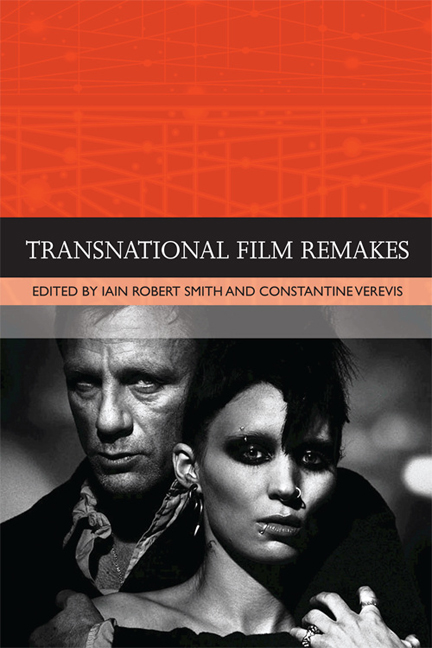Book contents
- Frontmatter
- Contents
- List of Illustrations
- Traditions in World Cinema
- Introduction: Transnational Film Remakes
- PART I GENRES AND TRADITIONS
- PART II GENDER AND PERFORMANCE
- PART III AUTEURS AND CRITICS
- 9 A Tale of Two Balloons: Intercultural Cinema and Transnational Nostalgia in Le voyage du ballon rouge
- 10 ‘Crazed Heat’: Nakahira Ko and the Transnational Self-remake
- 11 Remaking Funny Games: Michael Haneke's Cross-cultural Experiment
- 12 Reinterpreting Revenge: Authorship, Excess and the Critical Reception of Spike Lee's Oldboy
- 13 The Transnational Film Remake in the American Press
- Notes on the Contributors
- Index
10 - ‘Crazed Heat’: Nakahira Ko and the Transnational Self-remake
from PART III - AUTEURS AND CRITICS
Published online by Cambridge University Press: 22 December 2017
- Frontmatter
- Contents
- List of Illustrations
- Traditions in World Cinema
- Introduction: Transnational Film Remakes
- PART I GENRES AND TRADITIONS
- PART II GENDER AND PERFORMANCE
- PART III AUTEURS AND CRITICS
- 9 A Tale of Two Balloons: Intercultural Cinema and Transnational Nostalgia in Le voyage du ballon rouge
- 10 ‘Crazed Heat’: Nakahira Ko and the Transnational Self-remake
- 11 Remaking Funny Games: Michael Haneke's Cross-cultural Experiment
- 12 Reinterpreting Revenge: Authorship, Excess and the Critical Reception of Spike Lee's Oldboy
- 13 The Transnational Film Remake in the American Press
- Notes on the Contributors
- Index
Summary
We might think of remakes as taking place along four axes. The two most familiar of these would be the remake within national circumstances, as for instance with Hollywood often remaking earlier American films, or the transnational remake, again with Hollywood frequently remaking foreign films. This is not to say that other cinemas do not remake their own films (Hong Kong is particularly prone to this), or that we cannot find transnational remakes across other national cinemas, for example from Korea to Japan, or to Bollywood from Hong Kong, and so on. Another, somewhat familiar, axis would be instances of directors remaking their own film within the same broad national context. These are cases that move beyond the typical auteur who persistently works in the same idiom or with the same motifs. Of course, remaking one's own film is an attractive option for directors who do, in fact, continually rework their own devices. Howard Hawks, for instance, certainly was one who was given to authorial repetitions. Still, there is the clear remake Ball of Fire (1941) into A Song Is Born (1948). Raoul Walsh undertook The Strawberry Blonde in 1941 and turned it back into One Sunday Afternoon in 1948 (the name of the original film version done in 1933 by Stephen Roberts). John Ford, another powerful auteur given to repetitions and variations, more closely remade, say, his Judge Priest (1934) into The Sun Shines Bright (1953). And then there are surely the least familiar, and certainly the least studied (if perhaps because the most rare), instances of directors remaking their own films in different national contexts. We could point to Denmark's Ole Bornedal, who remade his Danish original Nattevagten (1994) into the American Nightwatch in 1997. Shimizu Takashi made Ju-On (aka Ju-On: The Grudge) in 2002; in 2004 he was tempted by Hollywood into remaking his own film, again in Japan but with an American cast, as The Grudge.
Each type of remake, as I have encapsulated them here, involves changes in both text and context. Even the auteur directors who remade their own films do not stand outside this duad. In the case of the Hawks and Walsh films mentioned above, the context shifts from pre-war to post-war; another context is genre – the shift from comedy to musical; another is aesthetic in the shift from black-and-white to colour.
- Type
- Chapter
- Information
- Transnational Film Remakes , pp. 164 - 176Publisher: Edinburgh University PressPrint publication year: 2017



